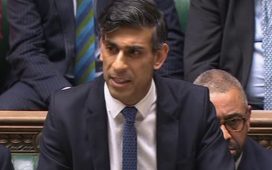Power always reveals. Robert Caro, the brilliant biographer of Lyndon Johnson, puts it extremely well: “When a man is climbing, trying to persuade others to give him power, concealment is necessary. But as a man obtains more power, camouflage becomes less necessary.”
This insight came to mind when considering the prospects for our country now that another politician called Johnson has secured a great deal of power. His successful gamble on a snap election has just taken the Conservatives to their largest parliamentary majority since Margaret Thatcher was at her zenith in 1987. This will make him unchallengeable within his party for the foreseeable future. A lot of the fresh faces and many of the grizzled ones on the Tory benches in the new parliament will feel a deep personal debt to the man who delivered on his primary promise to his party, which was that he would win them an election.
With a large stock of capital in the bank, he will be free to do as he likes, at least for a while. He can pick the cabinet he wants. He can be magnanimous to his foes – or take his revenge. With a majority of 80, he can shift the Conservative party rightwards or tilt towards the centre and be the “one-nation” Tory that he usually claims to be.
Whichever route he chooses, he will not be impeded by the opposition parties. The Liberal Democrats have lost their leader, one of the casualties of a crushingly disappointing night for the third party. Labour, smashed down to its lowest parliamentary representation since 1935, is already pitching itself into a necessary but vicious struggle for the party’s post-Corbyn future.
Ominously for the opposition parties, the Tories will seize the opportunity afforded by a big majority to enhance their prospects of winning again in four or five years’ time. At a minimum, they will implement a boundary review that will equalise constituency sizes to Labour’s disadvantage; they will introduce voter ID checks; and they will scrap the Fixed-term Parliaments Act so that the prime minister gets to choose the timing of the next election.
What will he do with all this power? The answer is much less clear than with many tenants of Number 10. Everyone is highly familiar with Boris Johnson and yet no one is really sure what to expect of him. There’s a bad Boris who is divisive and mendacious. There’s a better Boris, the humble-sounding and consensus-seeking leader on display when he spoke in Downing Street on Friday afternoon, who yearns to be a unifying and inspirational figure.
The deliberately thin and often contradictory Tory manifesto is a poor guide to what will come next. His biography offers clues, but not always consistent ones. Will we get the demagogic Johnson who has a back catalogue of racist remarks or the liberal Johnson who has argued for generosity to illegal immigrants? Will it be the governing-for-all Johnson he promised to be on the campaign trail or the polarising Johnson he can be when he spies advantage in aping reactionary populism?
In the brief time he has been at Number 10, he has used that address principally as a campaign headquarters. He has done very little actual governing. Who will tumble out of the Downing Street flat and turn up for work downstairs each morning? Will it be the lazy Johnson who is notoriously cavalier about detail or it will be an applied Johnson focusing his energies on addressing the many wounds and challenges of a damaged and disunited kingdom?
His responses will be shaped by the unusual coalition of support that has given him this power. The revolution in what we once called the Labour heartlands means that there are now Tory MPs for Bassetlaw, Bolsover, Blyth Valley and Burnley as well as Tory MPs representing Buckinghamshire and Berkshire. We cannot be sure whether this upheaval is a one-off triggered by unrepeatable circumstances or the start of a more enduring realignment of British politics. He can’t know either. In the wake of his victory, he was sensible to suggest that he understands that a lot of these votes have only been “lent” to the Conservatives, an implicit acknowledgement that his support base is highly contingent. It is also worth noting that the Tory national vote share rose only by a very modest amount. He mainly owes his chunky majority to Labour’s multiple shortcomings and his immense good fortune in having Jeremy Corbyn as his principal opponent.
His most consistent character trait has been ambition. We must assume that he will be driven by a desire to sustain the Tories’ new voter coalition in order to win the next election. That will demand a very different kind of Conservative government, one that delivers on the pledge to end austerity and pays a lot more heed to the concerns and needs of areas of the country that have been strangers to the Tory party for many decades. “We have to change our own party,” he said in Downing Street, a remark you usually expect to hear from the election loser, not the winner.
He has promised improved schools, better hospitals and extra police officers, and generally raised expectations that we will see substantial investments in public services, especially in the parts of Britain that prosperity has overlooked. It is moot where he is going to find the money when his manifesto ruled out any rises in any of the main forms of taxation. “I will not let you down,” he says. It will be easy to see whether he has. If bed shortages in the NHS remain acute, if the fabric of schools continues to decay, if public transport becomes even more creaky, he won’t have anywhere to hide.
This will have implications for Brexit. There will not be a second referendum. The Remain cause expired in the early hours of Friday morning. Mr Johnson will get his withdrawal agreement through the Commons to meet his end of January deadline. This also means that the Tories now fully own Brexit and all of its consequences. There will be no parliamentary paralysis or obstructive opposition parties to blame if it goes horribly wrong.
Under the threat of a recession if he makes a mess of it, he will be quickly plunged into the hugely complex negotiations about Britain’s future relationship with its closest neighbours and most important trading partners. On the way to victory, he recklessly said that he would not extend the transition period if he had not secured a free trade deal by the end of next year, but senior Tories predict that this imprudent declaration will be discarded by a man not famous for his fidelity to his pledges. The Brexit ultras have never really been convinced that he is one of them and he now has the space to prove them correct for the good of his country. The size of his majority means that he can cut himself free of the fundamentalists and pivot towards a form of Brexit that will maintain a reasonably close relationship with the EU and protect jobs in the car industry and other manufacturers in the Midlands and the north of England.
There will be inherent tensions in this government. The size of its majority will be taken by some shrink-the-state Tory ideologues as licence to charge further rightwards. This will be even more the case if Labour is mad enough to keep itself out of contention by continuing with some variation of the suicidal Corbyn experiment. Yet a right-lunging Tory party will be a betrayal of the very voters whom Mr Johnson pledges to work for “day and night”. Forward-thinking Tories would also be wise to think hard about one of the poison pills contained in this victory. They have again won an election thanks to the votes of the middle-aged and the old, while becoming even more toxic to the majority of the young.
The boy who wanted to be “world king” wears the crown, but he does not reign unopposed across all the kingdom. The surge to the SNP, the night’s other big winners, portends a head-on constitutional car-crash between nationalists demanding a second independence referendum and a Conservative prime minister who says he will never give them one.
Some depressed non-Tories are talking and writing as if the Conservatives have already won the next election as well. My crystal ball cannot peer that far into the future. What I do know is that nothing lasts forever. Margaret Thatcher was toppled three years after her 1987 landslide. David Cameron was out of Number 10 barely more than a year after his “sweetest victory” in 2015. Every triumph contains within it the seeds of later nemesis. Power reveals. Another thing power always does is disappoint.
• Andrew Rawnsley is Chief Political Commentator of the Observer














